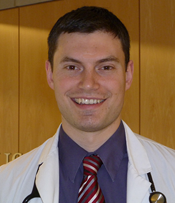Medicine from the heart . . . Noah Rosenberg
December 20, 2012
On Thursdays, the Daily Voice showcases selected Thursday Morning Memos, reflective essays about clinical experiences written by faculty, alumni, residents and students of the Department of Family Medicine & Community Health and, occasionally, contributors from other departments. Thursday Morning Memos is UMass Medical School’s homegrown version of narrative medicine, in which the authors process their experiences through writing. To learn more, visit: http://www.umassmed.edu/news/articles/2011/personal_stories.aspx.
Noah Rosenberg, MD, a 2012 School of Medicine graduate in his first year of family medicine residency at the Barre Health Center, writes about a spiritual experience that he had recently on the wards. Noah is a three-time winner of the UMMS Richard Berlin Writing Competition. This piece reminded me of Raymond Carver's "What the Doctor Said" when he wrote about the doctor after finding out that he had lung cancer.—Hugh Silk, MD
“he said are you a religious man do you kneel down
in forest groves and let yourself ask for help
when you come to a waterfall
mist blowing against your face and arms
do you stop and ask for understanding at those moments
I said not yet but I intend to start today”
Sharing a Prayer
 I had never been much of a praying man. Aside from the occasional quiet, unpracticed plea for a loved one’s safety, I frankly felt like a novice when it came to prayer. Each time the thought came up to pray, the form and words somehow eluded me, hanging just beyond my grasp. I badly wanted to see my lack of prayer as something different than my father’s complete inability to stop and ask for directions, but the comparison continues to linger. Time and habit being so strong, it seemed like the possibility for articulate, heartfelt words from me to the divine had simply passed me by, as paths not pursued tend to do. Standing next to Iris’s bed with the hospital chaplain, however, I was transformed as abruptly as I imagine one can be.
I had never been much of a praying man. Aside from the occasional quiet, unpracticed plea for a loved one’s safety, I frankly felt like a novice when it came to prayer. Each time the thought came up to pray, the form and words somehow eluded me, hanging just beyond my grasp. I badly wanted to see my lack of prayer as something different than my father’s complete inability to stop and ask for directions, but the comparison continues to linger. Time and habit being so strong, it seemed like the possibility for articulate, heartfelt words from me to the divine had simply passed me by, as paths not pursued tend to do. Standing next to Iris’s bed with the hospital chaplain, however, I was transformed as abruptly as I imagine one can be.
It was Friday evening before my golden weekend—that previously unfathomable product of duty hour restrictions—and my wife had already called once to inquire about when I was coming home. I had not picked up, this time choosing to spare her the invariable answer: “soon.” Some tiny part of me thought that maybe if I never left the hospital, Iris would never die. She had been scratched by one of her still-beloved “kitties,” as she said, unleashing into her bloodstream a characteristic bacteria, the name of which makes young doctors think they know many things, and reminds elder physicians of a fact faded into reflex. Despite the strongest, broadest antibiotics medicine had to offer, her kidneys and liver were still shutting down. A mix of sadness and frustration at our powerlessness to help her brought me to her room. In case she died over the weekend, I wanted to say goodbye, and by chance or something else, the chaplain Iris had requested arrived at her room at the same moment I did.
Iris gazed up at us with her kind, yellowed eyes, telling us about people in her life who had been good and bad to her, and the love she had for them both alike. She told us about her children, including a son with bipolar disorder, and a new baby granddaughter, whose tiny face she liked to imagine before falling asleep each night. With a strong sadness in her voice, she recounted being put up for adoption by a young mother who went on to elope with the mother’s brother-in-law. She recalled growing up in a “school for girls,” and thanked me for explaining things clearly. As she said, “I only got the second grade,” so bilirubin levels became “liver tests,” and furosemide became “water medicine.” We could not do the one thing we wanted more than anything else—to keep her alive—but she thanked us so sincerely for all that we had done, that I struggled to hold back tears.
“How about the Sacrament of the Sick?” asked the chaplain. With a knowing smile, Iris silently nodded her head and closed her eyes. The chaplain began: “Are any among you sick? Where three souls meet as three rivers, let them call for the elders of the church and have them pray over her, anointing her with oil in the name of the Lord. And anywhere souls meet to pray, the prayer of faith will save the sick, and the Lord will raise her up, and anyone who has committed sins will be forgiven”.
“Amen.” We said it in unison, me for the first time in my life. Though the chaplain did the praying for the three of us, every word she said echoed in my heart. And then Iris, the most forgiving person I have ever known, began listing all the important people in her life: her children, her granddaughter, her doctors and nurses, the chaplain, and even her mother, and she called us all angels, one by one, as if asking us to come forward and be blessed.